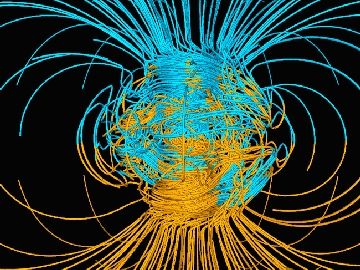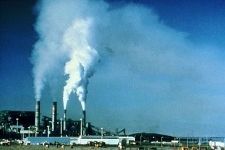
Publisher:
Bonnie King
CONTACT:
Newsroom@Salem-news.com
Advertising:
Adsales@Salem-news.com

~Truth~
~Justice~
~Peace~
TJP
Nov-12-2009 22:44

 TweetFollow @OregonNews
TweetFollow @OregonNews
Greenscam: Cap & Trade
Ersun Warnke Salem-News.com Business/Economy ReporterA review of climate science, economics, and public policy: thoughts from EPA lawyers opposed to Cap & Trade proposals.
 Courtesy: universetoday.com |
(EUGENE, Ore.) - Climate change is a big issue for government at the State, Federal, and International levels. Climate change is a difficult issue because there is broad disagreement as to whether or not it is real, what causes it, and who should pay for mitigating actions.
The Oregon Senate, in SB 80, proposed implementing a Cap & Trade program to reduce greenhouse gas (GHG) emissions in Oregon. The Federal government is currently considering similar legislation. Now, two EPA lawyers, Allan Zabel and Laurie Williams have released a video criticizing the proposed Federal legislation.
I will give a brief review of the science and economics of climate change, and share the arguments of these EPA lawyers.
The Science of Climate Change
Climate science is complex. I am not a climate scientist, so my perspective on it is limited to what I do know, and what is printed by climate scientists. What is crucial here is the concept of uncertainty.
Science does not deal in the black and white / true and false declarations made by pundits and policy makers. The scientific uncertainty about the climate arises because the earth's climate is a very large, complex, and dynamic system. Trying to take this system and put it into a linear model relies on making assumptions about cause and effect that cannot be proven.
For example: global average temperature is an estimate based on sampling and modeling. Temperature is recorded at thousands of points around the world, and these samples are put into a computer model that gives an estimate of global average temperature over a fixed time period based on these samples. Because it is impossible to say for sure how heat is distributed around the globe, there is a certain level of uncertainty with this model. Uncertainty does not mean that the estimate is wrong.
The estimate provided by scientists is certainly better than the guess of the person on the street, but it is still only an estimate.
 The Earth's Magnetic Field: Gary A. Glatzmaier UCSC |
Understanding changes in temperature poses more problems, because it relies on hypotheses on many levels about what factors affect temperature. Changes in the amounts and types of solar radiation, changes in cloud cover, changes in atmospheric composition, and other environmental changes such as how energy is either absorbed or reflected by land, water, and ice mass all potentially play a roll in temperature.
The subject of greenhouse gas concentrations, and their effect on temperatures is itself a subject of uncertainty. CO2 is the GHG where the largest changes in concentration have occurred, but other gases are hypothesized to trap heat to a far greater degree than CO2. Another area where uncertainty exists is with solar radiation, which is the energy source that heats the earth. Solar radiation occurs in a broad spectrum, and both the intensity and composition of the solar radiation reaching earth is continually fluctuating.
Another factor is the earth's magnetic field, which repulses certain types of solar radiation. The earth's magnetic field fluctuates over time, thus changing the amounts and types of solar radiation entering the atmosphere.
Climate scientists create models that reflect their best understanding of these many various factors, and then estimate the way that particular changes in one or more variables, such as GHG concentrations, will affect temperature. These estimates are subject to an unknown degree of uncertainty, but it is probably high. Scientific uncertainty is not a reason to do nothing. The scientific estimate, based on research and analysis, is certainly better than the guess of a person off the street. However, it is still an estimate.
In order to put things in perspective, consider the accuracy of the local weather forecast for any given small area for a period a week in the future. You probably see the weather forecast on the news every day, or at least a few times a week. The accuracy of these forecasts may be better than a random guess, but it is not super precise.
Now, imagine doing a forecast of the weather for the entire earth for the next several decades. If you increase the number of unknowns, increase the area of the prediction, and increase the time span of the prediction, do you expect it to be more or less accurate?
Experience vs. Predictive Modeling
Predictive modeling is uncertain. That is acknowledged by all scientists. The degree of uncertainty is subject to scientific disagreement, because it cannot be precisely proven. However, experience does show that the climate is subject to change. Winters may be more or less harsh, rainfall varies, summers may be inordinately warm, and so on. Even if you dismiss predictive modeling, you are still faced with the exact same possibility of future climate change, except that you have no idea whatsoever what form that climate change may take.
Arguing that climate change predictions are wrong in no way changes the fact that the climate is subject to unpredictable change. Sound public policy should always take into account the possibility of climate change, particularly as it relates to food production. Climate change results in crop loss and famine on a regular basis, and has throughout recorded history. Regardless of the extent to which human activity contributes to climate change, climate change is always a possibility, and prudent measures to adapt to climate change should be a routine part of public policy.
The Economics of Climate Change
The current debate regarding the environment and climate change has been horribly polluted by the financial interests at stake. Government, academia, and media all operate on a pay-to-play basis. As a result, issues with the greatest financial interests at stake gain unwarranted exposure, and the debate is often skewed by the financial interests of the participants. Paid advocacy has the power to both drown out honest opinion, and to muddy the waters, making it impossible for observers to discern between honest opinion and paid advocacy.

Exxon, for instance, paid millions of dollars for decades to fund sham institutes that denied the conclusions of climate scientists and circulated claims that climate scientists are part of a conspiracy to destroy American. Tom Coburn has promoted these claims on the Senate floor.
The climate change conspiracy theory is a rehash of the “global communist conspiracy,” which has now morphed into a global banker/Jew conspiracy depending on who you talk to. These claims go back to Tsarist and Nazi propaganda, which asserted that communism was part of Jewish conspiracy for world domination. With the collapse of communism, these theories have now come full circle. All of these conspiracy theories are typical Monarchist/Fascist propaganda, which claim that the rich and powerful are really the allies of the people against the imagined enemies who are working to destroy them.
The reason that climate change is the subject of all of this propaganda is that the amounts of money at stake are enormous. Coal and oil are the foundations of the industrial economy. Nothing is manufactured without coal and oil. Nothing is grown without coal and oil. Nobody travels more than walking distance without coal and oil.
Modern life in an industrial society is completely dependent on extraction and consumption of coal and oil.
Reducing energy consumption implies a reduction in industrial production and consumption of industrially produced goods. It also implies a shift in power within society away from individuals and groups whose wealth and power are based on monopolization and extraction of energy resources. Individuals and groups whose wealth, power, and prestige are based on industrial production are naturally opposed to relinquishing their elevated positions. The mass of the population that is dependent on industrial production for survival is easily convinced that any reduction in production is contrary to their interests.
What is crucial to point out here is that mass consumption of energy resources has a fixed limit. Coal and oil are not produced, they are extracted and consumed. Once the fixed stock of coal and oil is gone, it is gone, and everything built on it is gone with it. For the past century, industry has acted like a bunch of drunken sailors, who have mutinied, thrown the captain overboard, and gotten heavily into the rum rations. The ship has been left to drift. Now, the rum is running out, and a few of the more rational voices are encouraging these drunks to sober up before it is all gone, and get back to the business of sailing the ship. In any case, the rum will run out. The question is whether or not the ship sinks before it does. The only difference between this analogy and real life is that a ship can sail without rum. Industrial society will sink without coal and oil.
 Courtesy: library.thinkquest.org |
Industrial society is not essential to humanity. Humans existed long before it, and will exist long after it. What is at stake here is stability and quality of life. In particular, industrial societies would like to maintain their positions of power in the world, which are based on monopolization of energy resources, and the war making capacity that comes with that. Within a society such as the United States, the surplus of consumer goods that can be created using industrial production has facilitated the maintenance of a hierarchical society with stratification based on wealth derived from industrial production. Those at the top of this hierarchy enjoy their positions of privilege and would like to maintain them. A smooth transition from industrial society based on extraction of coal and oil to some other basis would be in their interests because it would keep the social hierarchy intact.
 Courtesy: fhsu.edu |
Much of the debate about climate change policy has nothing to do with climate change or the environment and everything to do with managing declining energy stocks. The connection between climate change and greenhouse gasses produced from burning coal and oil provides an opening for parties interested in managing energy consumption to promote policies with that in mind.
It is true that much of the advocacy on climate change policy is disingenuous, but that does not mean that the intention is not worthy. The public has consistently rejected all attempts to convince them to exercise restraint in energy consumption. Even today, most of the discussion in opposition to legislation on climate change centers around the fantasy notion that current levels of consumption can be maintained.
People act as though it is their right to consume stocks of coal and oil. Did they create the coal and oil? Do they have any more right to consume it than anyone else? If so, where is this right derived from?
People complain about cutting their standard of living, but what of future generations? In one century roughly half of the stock of oil on earth has been consumed. It is an interesting proposition that this one particular group of humans in all history has a unique right to consume such a large proportion of a fixed resource.
Of course, no such right exists. The people who promote this gross irresponsibility and disregard for humanity and the environment are wrong. Humans do have a responsibility to maintain the environment, and to insure that adequate resources exist to provide for future generations. The rule of responsible stewardship is that you consume no more than can be regenerated. When it comes to coal and oil, the assumption is that regeneration is very slow, or may not occur at all, and responsible consumption must reflect this.
Cutting Greenhouse Gas Emissions: Cap & Trade
“Cap & Trade” is the broad term for a policy that would impose taxes on CO2 emissions. These taxes are in essence a tax on energy consumption. They would force decreased energy consumption, which would ripple throughout the entire economy as a reduction in industrial production.
Under these schemes, existing industrial producers would be given credits for their CO2 emissions. The “Trade” aspect of Cap & Trade would allow these producers to buy and sell those credits. An additional aspect of Cap & Trade is that “offsets” for carbon emissions could also be bought and sold. Offsets would include things like forests that absorb carbon dioxide from the atmosphere.
Cap & Trade has been proposed in Oregon as Senate Bill 80. The Federal Government is currently proposing similar legislation.
EPA Lawyers Argue Against Cap & Trade
The Huge Mistake - Climate Change Solutions 2009 |
Allan Zabel and Laurie Williams are two career lawyers working for the EPA. They have released a video on the internet criticizing Cap & Trade proposals. Thank you to Democracy Now for drawing attention to this story.
“Climate change cannot be fixed by tweaks to existing facilities... It requires an energy revolution.”
“Energy from the uncontrolled use of fossil fuels is cheap, and clean energy remains expensive.”
“Cap & Trade for climate change has been tried in Europe. It produced harmful volatility in energy prices and few greenhouse gas reductions. It raised energy prices for consumers and made billions in windfall profits for utilities.”
“Congress's climate plan would allow all required greenhouse gas reductions for almost twenty years to be met with carbon offsets from the U.S. and abroad.”
“In my work at EPA I have been overseeing California's cap & trade and offset programs for more than twenty years. My unique and extensive experience has convinced me that carbon offsets won't work. They can't be certified or verified as real additional reductions. Since the most flawed offsets are generally cheapest they will be most in demand. These flawed offsets will make it look like we are getting greenhouse gas reductions when we are just getting business as usual.”
“Like the sub-prime mortgages and other creative financial instruments that helped bring us the current recessions, carbon offsets lack integrity. They make easy profits for offset investors while increasing the risk of climate disaster for all of us. That is the big rip off.”
Other Economic Flaws with Cap & Trade
Another huge flaw in Cap & Trade legislation, which Zabal and Williams do not address, is the issue of carbon credits. Because existing producers are given credits for free, this cements their monopoly position. It actually increases the competitive disadvantage for new more efficient producers because new producers have to pay for emission allowances, while existing producers get them for free. If a new producer wants to invest in technology that will reduce consumption of fossil fuels, the cost of paying for emissions allowances may be greater than the additional profits that could come from more efficient production. The effect of this will be that only existing producers can profitably deploy more efficient technology, and consequently, they will be able to maintain their monopoly positions, regardless of whatever technological innovation takes place.
The other major problem with Cap & Trade is the issue of trading emission allowances on an open market. This creates a new avenue for financial speculation, and opens up all industry to even greater control by speculative capital. Financial speculators do not make money off of production. They make money by gambling on market fluctuations. Since the easiest may to predict market fluctuations is to create them, financial markets have always been plagued by problems of rigging, collusion, false reporting, and insider dealing. To the extent that productive business relies on markets, fraud by financial speculators interrupts productive business activity, and the fact that people are making money engaged in speculation means that they aren't engaged in productive activity. As a society, we need to eliminate financial speculation to whatever extent possible, not create new ways for speculators to make profits.
Conclusion
Cap & Trade legislation is a good example of how a valid idea, such as compelling reductions in the consumption of fossil fuels, can be hopelessly twisted once it is exposed to the legislative process. The intentions behind taking mitigating action on climate change are good, but the policies that business and financial interests are trying to sell under that banner would be disastrous.
As a society, we do need to reduce consumption of fossil fuels. The only choices that people have are to voluntarily reduce consumption in an orderly way, or to face forced reduction through crisis at a later date. Denial and blame are not options, they are a choice of crisis.
As individuals and businesses, you do not need to rely on government to make wise decisions regarding energy policy. The house you live in, the car you drive, where you buy your food, who you work for, and what you invest your time and money in are your own choices. If you make these choices wisely, with an eye toward saving energy, consuming products that are less reliant on fossil fuels, and investing in production that is less reliant on fossil fuels, then you will be prepared for the inevitable decline in fossil fuel based production that must come. In the meantime, you will save money, become more self reliant, and increase yours and your family's security.
===================================
 Salem-News.com Business/Economy Reporter Ersun Warncke is a native Oregonian. He has a degree in Economics from Portland State University and studied Law at University of Oregon. At a young age, his career spans a wide variety of fields, from fast food, to union labor, to computer programming. He has published works concerning economics, business, government, and media on blogs for several years. He currently works as an independent software designer specializing in web based applications, open source software, and peer-to-peer (P2P) applications.
Salem-News.com Business/Economy Reporter Ersun Warncke is a native Oregonian. He has a degree in Economics from Portland State University and studied Law at University of Oregon. At a young age, his career spans a wide variety of fields, from fast food, to union labor, to computer programming. He has published works concerning economics, business, government, and media on blogs for several years. He currently works as an independent software designer specializing in web based applications, open source software, and peer-to-peer (P2P) applications.
Ersun describes his writing as being "in the language of the boardroom from the perspective of the shop floor." He adds that "he has no education in journalism other than reading Hunter S. Thompson." But along with life comes the real experience that indeed creates quality writers. Right now, every detail that can help the general public get ahead in life financially, is of paramount importance.
You can write to Ersun at: warncke@comcast.net
Articles for November 11, 2009 | Articles for November 12, 2009 | Articles for November 13, 2009


googlec507860f6901db00.html

Salem-News.com:

Terms of Service | Privacy Policy
All comments and messages are approved by people and self promotional links or unacceptable comments are denied.
Engle November 19, 2009 6:23 pm (Pacific time)
Many of those who have been opining for alternative energy have been referencing Spain as their ideal model. Spain's alternative energy program has been a major bust. Fortunately the "cap and scam" will be just a bad memory, for it will never have a chance in getting passed in it's current House format. We can still tackle common sense pollution problems while also developing more enegy independence to bolster our national security. For those of you old enough, it's been 36 years, recall the middle east cutting off their oil exports. Too much on the line to fall for the junk science that the zealots have been using. CO2 is our friend. Just look at the geologic record, not some barker like Al Gore who has made over $100 million in his not so altruistic claim to wanting to help save the world from a warming that is not happening.
Henry Ruark November 16, 2009 11:29 am (Pacific time)
Ersun, OR/R, et al: Open, comprehensive, honest and direct dialog again builds better understanding(s) in a very complex area. Simple fact is that every natural resource, commoditized by market forces feeding first and foremost private profit. is truly "expendable" and all are already well-and-truly wasted by our ongoing systems and lack of demanded controls clearly obvious as realities of 21st Century sharply focus our attention. For further authoritative comment see HARPERS Dec. issue for "Insights into Energy Security", dealing in depth and detail specifically with development of alternative energy sources. Its direct impact on true needs, market forces, and wise decisions demands your attention. Concluding pgh of this sponsored report: "We still need to make serious decisions that require broad citizen engagement on the realities. We must all work together. We have a shared mutual interest in making our lives lovely, helpful, and sustainable." Congratulations to Ersun et al for making a major start right here in our own S-N open, honest, direct dialog channel.
Oregon Reader November 15, 2009 9:25 am (Pacific time)
Ersun, the wind farm issue that I refer to is not the tax credit, buit the use of "green" credits.
Ersun Warncke November 15, 2009 2:06 pm (Pacific time)
Oregon Reader: The simplest alternative would be increasing taxes on gasoline and electricity. This is not considered "politically feasible" (i.e. it is opposed by the people who pay for political campaigns) which is why it is not talked about. If the public agreed to increased taxes on gasoline and electricity, and used that money to invest in publicly owned renewable energy infrastructure, then the result would be a transition toward public ownership of energy resources. That would be a very different long run outcome than what would happen with cap and trade, which should give you an idea of why business and capital interests have coalesced around cap and trade as their preferred policy.
Oregon Reader November 15, 2009 5:29 am (Pacific time)
OK, I think I understand the system, and I agree that providing a benefit to existing producers is patently unfair. That would be similar to the way fishing quotas have been assigned. If you weren't one of the few in the game at the time, you have to pay big bucks to play. Thanks for your response. Do you have a proposed alternative concept? From what I have read, there are not a lot of competing ideas. I think that if they could structure the system similar to the SO2 markets, they might be going in the right direction, but it would only apply to new projects, with no impact on existing facilities (unless they changed the game over the last 15 years, since I have kept track.)
Ersun Warncke November 15, 2009 12:55 am (Pacific time)
With Cap-Trade emission credits are given to existing producers. Then they can sell them to others. Over time, the caps are lowered, which makes emission credits worth money. When producers start having to pay for emissions credits, these costs are transfered through to consumers, which is the same as a tax on production/consumption. The end result of this is that the cap reduces overall fossil fuel consumption, and the fact that emission credits are given to existing producers for free means that they will end up getting all of the revenue out of this tax scheme, other than what is siphoned off through market activity. This is why I view it as a tax that ends up in private hands. This is just my perspective. The whole thing is so complex that it is hard to trace out where every possible money trail leads.
November 14, 2009 11:25 am (Pacific time)
Ersun, you wrote, "Cap and Trade is basically a tax where all of the tax revenue goes into private hands (a "free market")".
I do not understand what tax revenues are being used in this system. You mentioned the tax "in essence" but did not explain really what this is referring to. Could you help me understand this, please?
Ersun Warncke November 13, 2009 11:26 pm (Pacific time)
Oregon Reader: Check out the video, it is made by lawyers who have been doing enforcement for "acid rain" cap-and-trade, and they are saying it won't work for CO2. I don't know anything about this myself, but that is what they are saying. You give the example of wind farms, but this example is not an example of cap and trade in effect. It is an example of government subsidies being used to build an industry. Cap and Trade would give existing coal based producers emission credits. Companies building wind farms would pay even more for their kit, all of which is produced using processes that consume fossil fuels and result in CO2 emissions. Cap and Trade would make wind farms more expensive than they are now relative to existing coal fired electric generation. The result would be to cement a monopoly by existing producers vs. more efficient producers.
Oregon Reader November 13, 2009 12:31 pm (Pacific time)
By the way, the xxx was supposed to be filled in with SO2 emission credits, which is highly efficient, and designed to regulate acid rain. I wish the text box was wider so that it would be easier to draft lengthy comments. Even though you don't like the overall concept, think about the instances where utilities develop, say, wind farms, that are costly and not highly efficient. In the economic decision, if they pencil in the assumption that there would be credits available to sell to other companies, if it makes the farm financially feasible, but otherwise it would not, isn't this a private decision that benefits from the credit? This is a real-world example. There are others. When the cost of these credits is greater than the costs that they offset, then a company would develop its own project, or partner with another company for shared resources. I am not an expert on the Cap and Trade dogma, but am familiar with the historic use of that market for the types of financial products I have mentioned. And they have produced economically optimal results in the majority of cases.
Ersun Warncke November 13, 2009 10:08 am (Pacific time)
Oregon Reader: It is true that there are many ways to make production and energy consumption more efficient. These only go so far though. I am not saying let the market decide. The decisions made by "the market" are terrible. I would support much higher gasoline taxes and increased electricity rates. I would just prefer to state that clearly and plainly as opposed to doing it through the back door. I would also like to see the money being raised through increased costs for gasoline and electricity going to the public instead of the private. Cap and Trade is basically a tax where all of the tax revenue goes into private hands (a "free market"). That is not the kind of policy that I can support under any conditions.
Oregon Reader November 13, 2009 7:45 am (Pacific time)
This is a good idea for a story, but you should explore the market for xxxxxx. The concept is economically sound and can be implemented to cause the appropriate behavior among market players. The evidence exists. Also, you wrote, "Reducing energy consumption implies a reduction in industrial production and consumption of industrially produced goods. It also implies a shift in power within society away from individuals and groups whose wealth and power are based on monopolization and extraction of energy resources." Now, the first sentence is not entirely correct. There are forms of production that can be implemented that do not increase consumption, and actually decrease consumption. These tools are being used by economically-minded corporations, not because they care about the environment, per se, but because they positively affect the bottom line. The market for credits has been shown to cause the development, for example, of low-emission electricity generation plants that would not otherwise have been built. The market for credits will be huge: "The global carbon credit market is comprised of about 10 markets (such as the European Climate Exchange and the Chicago Climate Exchange) worth $126.35 billion as of 2008. The market has grown 100.5 percent from $63 billion in 2007 and has catapulted twelve-fold from $10.86 billion in 2005. The carbon credit market is expected to continue to grow. The World Bank expects the market to be worth $150 billion in 2010, about 70 percent of the projected size of the global semiconductor market in 2010." See http://joongangdaily.joins.com/article/view.asp?aid=2912293. The second part of the quote I used from your article is spot-on: there HAS to be a power shift from those currently in control of oil and natural gas commodities. But, I repeat, we do not have to have lower production or lower standard of living to achieve lower overall pollution. In addition, there will be alternative sources of energy that are being developed today that make the argument moot, since we will not have to have lower energy consumption to meet the goals espoused in this article. Keep up the thought-provoking articles.
B. Aldredge November 13, 2009 5:47 am (Pacific time)
I think what you are saying, essentially, is to let the market decide. I agree. Government intervention is not going to help. Write your Legislators and voice opposition to this terrible legislation at http://tiny.cc/1HVIB.
Rich Bailey November 12, 2009 11:29 pm (Pacific time)
Great story. All Cap and Trade will do is line the pockets of All Gore and Wall Street who with the help of the Government the air that we breath a commodity. Thanks but no thanks!
[Return to Top]©2026 Salem-News.com. All opinions expressed in this article are those of the author and do not necessarily reflect those of Salem-News.com.